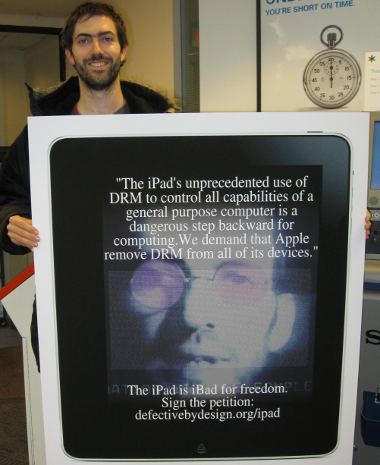Update 2010-01-25: We will be meeting outside the Theater
at 8:30am (Wednesday 27th), and will go until at least 10:30am. Stay tuned to http://identi.ca/dbd for updates and
coordination.
This coming Wednesday, January 27th, Apple has invited members of the
media to San Francisco's Yerba Buena Center for the Arts Theater to
"Come see our latest creation."

There has been much speculation about what Apple will be announcing,
with most of it revolving around a possible tablet PC -- basically an
oversized iPhone. But no matter the form factor, it's all but certain
given the direction Apple has been
going that any new product will be
DRM-infected and restricted by proprietary software.
Share this story! — Digg or reddit
The company who once announced to the world that they opposed DRM on
music has been pushing DRM in every other area of their business.
Apple's iPhone goes out of its way to apply DRM on every piece of
software on the device, saying it is illegal for users to install
software that comes from anywhere other than the official Application
Store.
Can you imagine a world where this same restriction is applied to your
laptop or tablet PC? That could very well be Apple's announcement on
Wednesday -- their latest restriction.
As in the past, they
didn't invite us to the event, but we thought we would go anyway, and
bring some friends. We'll be there to warn the public and the media
outside the event about Apple's support for DRM and proprietary
software.
Come help create the counter story in the media -- take photos, talk
to the press, and have fun with a little bit of theater to show that
Apple is not the force for creative expression they claim to be.
We got through to Steve Jobs before on music DRM, and convinced iTunes
to drop it. We know we can have success here. But we need to repeat
that effort and show that DRM on Apple computers means that people who
are actually interested in creativity and freedom will go elsewhere.
Press coverage of Apple events usually falls all over itself to praise
the style and sleekness of their devices. It's vital that we be there
to unmask the new product for what it undoubtedly will be -- another
seamless case and pretty screen hiding a new set of restrictions
and threats to the public's digital freedom.
We'll post the precise time and meeting location for our group here
next week -- since Apple's event starts at 10am, attendees will be
showing up at 9am, and we will want to be ready and outside the
Theater by then to hand out flyers and talk to people.
I'll be there representing the FSF and coordinating the action. Please
join us, and bring friends. Let us know you're coming at
info@defectivebydesign.org.
We'll meet at 8:30am outside the Theater.
Share this story! — Digg or reddit
John Sullivan
DRM Elimination Crew
FSF Operations Manager





